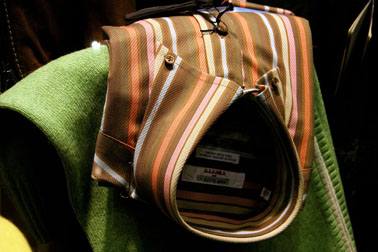
By Bonnie Christian
For small businesses, the desire to go green isn''t always enough. Many fashion designers and retailers aspire to promote ethical clothing, and yet the difficulty often comes down to the fundamental economic principle of supply and demand. Despite the challenges, some businesses have found a way to succeed.
Organic baby clothes brand Little Esop, based in New York, uses 100 percent organic fabrics. Designer Judy Posey, who founded the brand more than two years ago, believes that the higher cost of organic fabrics is the biggest deterrent to companies across the fashion industry, especially since "it isn''t a big enough thing yet" among consumers.
"In New York, everyone knows what organic is," Posey explains, "but across the country, some people just don''t care yet or don''t understand why it''s important."
But, Posey said, she thinks the market is growing as it enters the mainstream. Since she started her business, she''s noticed more results come up when searching on Google for organic manufacturers. "We have begun selling our brand to stores that don''t just sell organic, which I guess means there are more people that are looking for it. Bigger brands like H&M have started lines that are organic capsule collections," Posey added.
Posey told HuffPost she thinks costs will start to come down in the next few years, but at the moment, organic is more expensive because of the small number of suppliers and the constraints of growing crops like cotton organically, which further limits the supply.
"It''s way more expensive and harder to do if you have to start all over again," Posey said in reference to brands looking to switch to organic. "Especially because the designers get used to the manufacturers they already work with, and at the moment they have to decide, ''Does anybody even prefer to buy something that is organic over something that isn''t?''"
But as consumer awareness of the organic label increases, designers hope, so will the demand, and consequently prices will begin to drop.
Posey explained that the other challenge to consumers who want to buy organic is the absence of any industry rules or standards for what qualifies as "organic." The difference between organic and run-of-the-mill clothing lies in how the raw materials are grown, treated and manufactured — pesticide- and chemical-free — and what percentage of those materials go into any given garment.
"If you don''t really know about fabrics, it is impossible to tell if you''re buying organic or not," Posey said.
Stores that buy Little Esop ask that she carry certification from the Global Organic Textile Standard, an international trade group that verifies processors, manufacturers and traders as "organic," according to criteria that apply to every stage of production. The process is, moreover, seasonal and ongoing, and not a piece of paper that, once acquired, can be filed away and forgotten.
Still more challenging is the effort among some designers to create cruelty-free clothing, which has been often touted by organizations like People for the Ethical Treatment of Animals. U.S. brands taking this approach include Matt and Nat, a boutique that sells imitation leather wallets, belts and bags.
Matt and Nat''s founder, Inder Bedi, told HuffPost that not much has changed in his corner of the industry in the 15 years since he started his business, and cited the same reason Posey gave: It''s too expensive. Bedi''s brand does not use animal products, not even for dyes or glues, and it uses 100 percent recycled plastic bottles in all the linings of its bags and wallets.
Organizations like PETA have described the suffering to which many animals are subjected for fashion. Of making leather, PETA writes: "Millions of cows, pigs, sheep, and goats are slaughtered for their skin every year. They are castrated, branded, and dehorned and have their tails docked — all without anesthetics."
Bedi said the main inducement to interest people in this clothing niche is to be "fashionable before you are ethical." He explained, "You have to prompt the buyer to pick up the product at the store first. Once they do that, for a lot of people at the moment, if it''s vegan, that''s just a bonus."
"It''s about convincing people to spend a decent amount on a good quality product that isn''t necessarily leather from Italy," Bedi said.
Only time will tell if Posey''s predictions are accurate, or if the "bonus" of purchasing green clothing today becomes the primary incentive that drives consumers to seek out organic products tomorrow.
To learn more about these green designers, visit littleesop.com and mattandnat.com.

